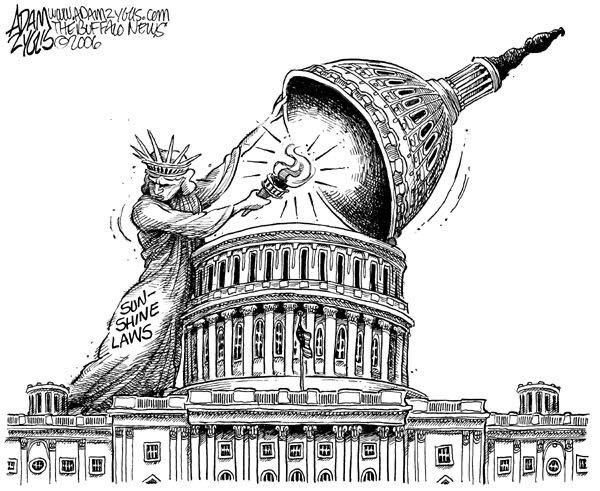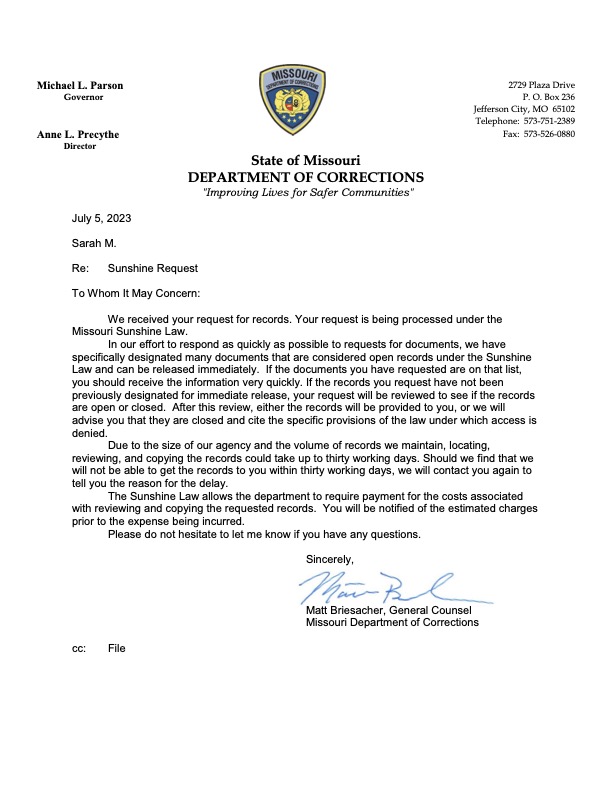In any society, one fundamental principle should guide the operations of government: transparency. This idea of an open government, where the public has access to records and information, is maintained through laws known as sunshine laws. Simply put, these laws are the ‘sunlight’ that illuminates the actions of government officials, ensuring they are accountable to the public they serve. These laws also apply to agencies like the Missouri Department of Corrections, which is responsible for managing the state’s prisons.
At the heart of ensuring transparency in the Missouri Department of Corrections is Matt Briesacher, the custodian of records. His role includes handling all requests for information based on the state’s sunshine laws. He is the gateway to the information needed by groups like Missouri Prison Reform, who aim to improve conditions within Missouri prisons and other government related operations.
Under the sunshine laws, when MPR submits a request for information, Matt Briesacher must respond within three business days. He should either provide the requested information or give a specific date and time when the information will be available, and not just an estimate. Over the past few weeks Matt has been responding with the same generic letter for each request, not providing specific dates for when records would be available.
For instance, in the case of the ‘Incarcerated Death Log’ requests, a record of all deaths in the Missouri state prison system, MPR has been left in the dark, sometimes not even getting a response from Matt. We’ve specifically asked for an updated version, including the name of one person recently executed by the state, Michael Tisius, but we have not yet received a response.
Moreover, MPR has also been left waiting for other vital records, such as details about educational programs in prisons, shipment dates for prison canteen supplies, meeting notes from the Chillicothe Correctional Center, and costs of phone and electronic services in the prisons. These are all crucial pieces of information that MPR needs to understand the current state of the prisons and advocate for improvements.
Let’s not forget that meeting minutes, records of what was discussed and decided in a meeting, are especially important. They serve as a legal record of government decisions and can be used for future reference. Not receiving these records, as was the case with MPR’s request for minutes from the Chillicothe Correctional Center, puts a damper on our efforts towards prison reform.
Now, imagine you’re trying to fix a problem, but you can’t see it clearly. Without full information, it’s like trying to navigate through a dark cave without a torch. For MPR, access to this information is the light we need to better understand the issues within Missouri’s prisons, push for effective reform, and ensure government officials, like Matt Briesacher, are held accountable. When that light is dimmed or turned off, it’s not just MPR who is left in the dark, but all the citizens of Missouri.
This situation serves as a reminder of the importance of sunshine laws in maintaining government transparency and accountability. When these laws are disregarded or information is denied, it hides the truth, hinders responsibility, erodes public trust, lowers civic engagement, and creates an imbalance in knowledge and power.
The fight for prison reform in Missouri is not just about improving conditions within prisons. It’s about ensuring transparency in the government and its institutions. It’s about shining a light on the operations of the Department of Corrections and holding officials like Matt Briesacher accountable to the public they serve.
When sunshine laws are respected and followed, groups like us at MPR are better equipped to carry out our mission. And that’s a win not just for us or the people incarcerated that we advocate for, but for all Missourians who believe in a transparent, accountable, and fair government.



I just read this article. I just submitted a request under the sunshine law, and received pretty much the same response. My letter said 60 days. I wanted to ask if you have received any of the records you’ve requested. Any at all? I’m just trying to figure out if I’m going to receive what I’ve requested or I’m just gonna get put off. Thanks!